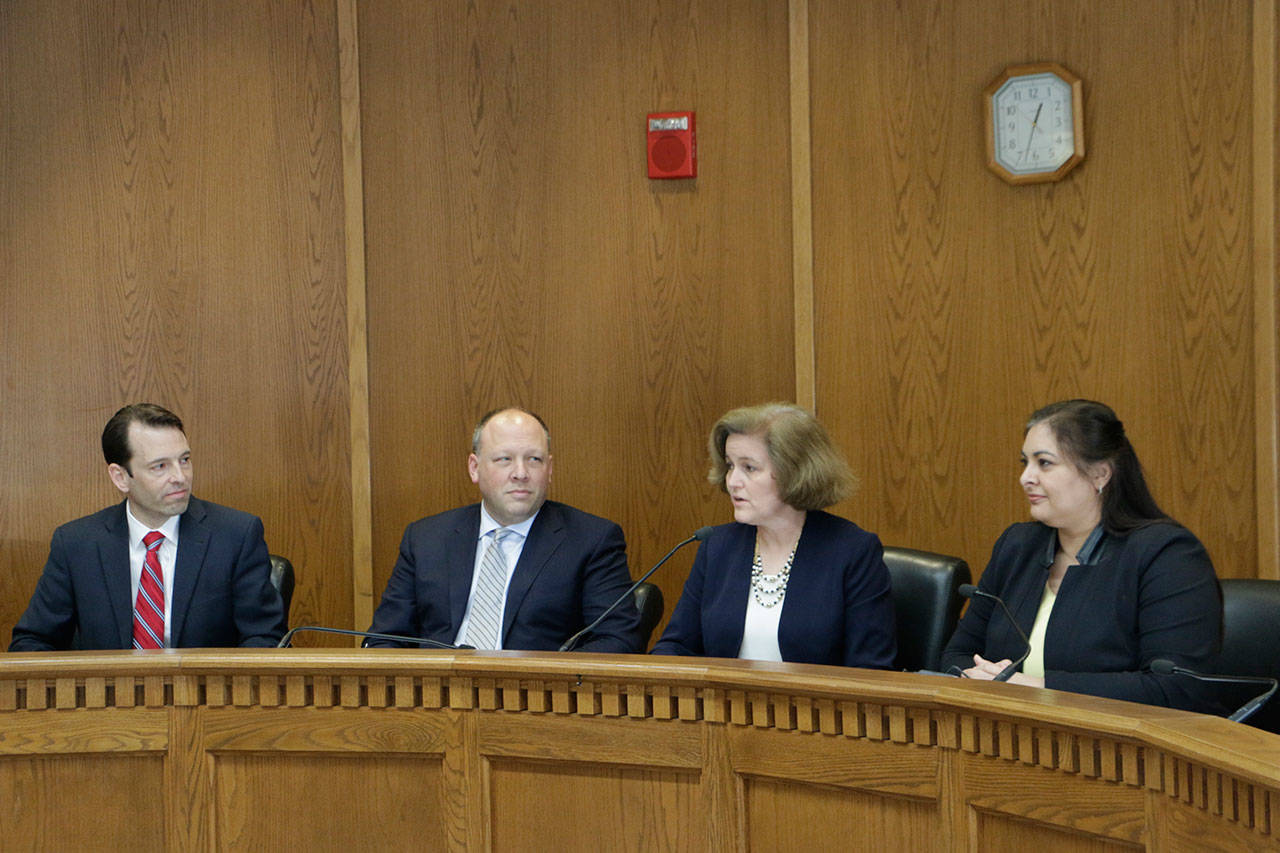By Rachel La Corte
and Tom James
The Associated Press
OLYMPIA — Budget discussions have advanced in the state Capitol, with Senate Democrats unveiling a two-year budget the same day House Democrats passed their own proposal — and both proposing versions of a new capital gains tax.
Along with new funds for behavioral and mental health care, both budgets dealt with Friday include increases for K-12 and higher education and long-term care for the developmentally disabled.
The House passed its budget on a 56-38 vote Friday evening. The Senate is expected to pass its budget plan this week.
Both Democrat-led chambers are moving through the process of finalizing their own proposals before moving to negotiations on a final unified budget plan.
Overall, the House budget includes about $2.3 billion in new spending, while the Senate budget proposes about $1.6 billion, according to nonpartisan budget estimates.
Democrats in the House and Senate also unveiled capital gains tax proposals alongside their budgets. While proceeds from the House version are incorporated into its overall budget, the Senate version was offered as a standalone option that would pay for various tax cuts.
If adopted, the Senate capital gains tax proposal is expected to bring in $780 million in its first year and would pay for several tax breaks starting in 2021: a tax credit for low-income families, a tax cut for small businesses, and increasing the number of seniors who are eligible for a property tax reduction. It would also fund the elimination of the sales tax on diapers, medical and mobility equipment, feminine hygiene products, and over-the-counter medications.
The proposal would levy an 8.9 percent capital gains tax on earnings from the sale of stocks, bonds and other assets above $250,000 for both individuals and those who file jointly. Retirement accounts, small businesses, homes, farms and forestry would be exempt.
The House version would bring in a similar amount in its first year, but it pays for spending, rather than tax breaks.
Opponents of a capital gains tax have argued that it’s a type of income tax illegal under state law. Litigation is likely if the Legislature approves the tax.
Senate Majority Leader Andy Billig, D-Spokane, said at a news conference announcing the budget proposal that while he’s not yet sure they have the votes for a capital gains tax, he still considers it a viable option this year.
“It’s more than the responsible thing to do, it’s an imperative that we rebalance our tax code and make sure that we’re helping our state to move forward in a way that reduces that tax burden on middle class and low-income families,” he said. “That’s the priority.”
For the underlying budget that increases spending on K-12 education, higher education and behavioral health, Senate Democrats are relying on three main revenue sources, including the real estate excise tax, which is estimated to bring in about $421 million through mid-2021.
Currently, all property sellers pay a flat 1.28 percent rate. Under Senate Democrats’ proposal, the rate remains the same for homes that sell between $250,000 and $1 million. But the rate increases to 2 percent for sales valued between $1 million and $2 million, and it rises to 2.5 percent for sales of more than $5 million. For homes that sell for less than $250,000, the rate is reduced to 0.75 percent.
The House version similarly proposes tax reductions for homes less than $500,000 and increases for homes more than $1.5 million.
The Senate plan also looks to repeal or amend three current tax exemptions, including the current sales tax break for residents who live in states that don’t have a sales tax, such as Oregon. Under the Senate plan, non-residents would be able to request sales tax refunds of more than $25 and would be limited to one refund per year.
To pay for wildfire costs, Senate Democrats also are seeking an increase in the tax on car, property and casualty insurance premiums.
The rate would increase from 2 percent to 2.52 percent, bringing in $125 million to state coffers over the next two-year budget.
In a written statement, Sen. John Braun, the budget leader for Senate Republicans, said that while he thought the Senate Democrats’ approach was a better start than the House’s, “the tax increases in the proposed Senate budget are still unnecessary, and the spending is higher than necessary.”
The Senate is scheduled to have a public hearing on its budget plan today. It is expected to have a vote of the full chamber later this week.
Once both chambers have passed their own budgets, the two sides will begin the process of hashing out a compromise, before ultimately sending a single final budget to Gov. Jay Inslee for his signature.

